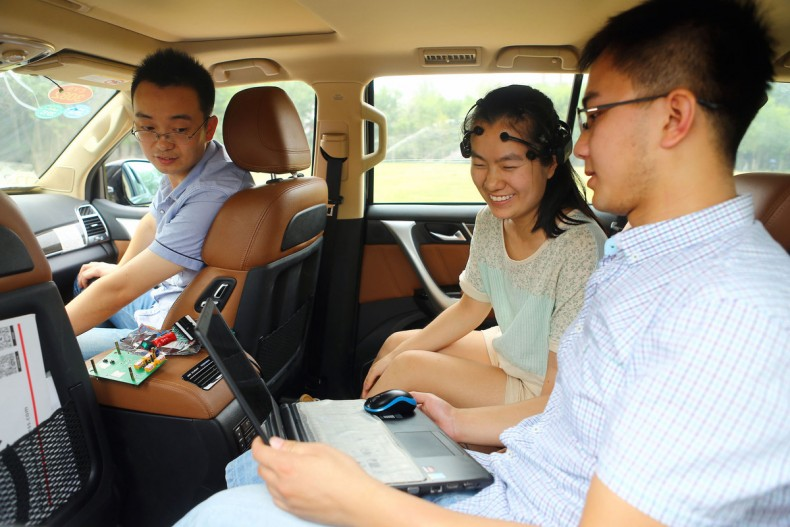
Chinese Engineers Unveils World’s First Brain-Powered Car – Control Your Car Using your Mind!
For the first time in the history of mankind, a team of researchers from China have developed a car that can be driven solely through brain power. This is the world’s first mind-controlled car that has been developed by researchers in the north-east port city of Tianjin. The Chinese researchers say that it is the country’s first car that requires nothing but brain power to drive. The research team from Nankai University, in the northeastern Chinese port city of Tianjin, has spent two years bringing the mind-controlled vehicle to existence. This might sound strange but all this has become possible with the innovative minds and dedication of the researchers to achieve the goal, which have made it a reality.
One can control the car just by wearing an equipment called brain signal-reader. Once you wear that equipment, you can control the car to move forward, backwards, come to a stop, and both lock and unlock the vehicle, all without moving your hands or feet. As of now, you can only control to move forward and backwards and you can see more as the researchers have been still working on this project.
The brain signal-reading equipment comprises of 16 sensors that have the capability to capture EEG (electroencephalogram) signals from the driver’s brain. The researchers have developed a computer program that selects the appropriate signals and translates them that eventually enables the control of the car using a person’s mind.

One among the researchers namely Zhang Zhao said, “The tester’s EEG signals are picked up by this (brain signal-reading) equipment and transmitted wirelessly to the computer. The computer processes the signals to categorize and recognize people’s intention, then translates them into control command to the car. The core of the whole flow is to process the EEG signals, which is done on the computer.”
Chinese Researchers Develops Brain-Powered Car
Chinese researchers from Nankai University have been working on this brain-powered car. Associate Professor Duan Feng, from the university’s College of Computer and Control Engineering, led the project. He emphasized that the technology is aimed at better assisting human beings and that it might soon be possible to combine brain-controlled technology and driverless cars, like the Google Self-Driving Car (SDC).
“Driverless cars’ further development can bring more benefits to us since we can better realize functions relating to brain controlling with the help of the driverless cars’ platform,” said Duan. “In the end, cars, whether driverless or not, and machines are serving for people. Under such circumstances, people’s intentions must be recognized. In our project, it makes the cars better serve human beings.”
Duan stated concerns about the potential road accidents caused by the driver being distracted while their brain was in control of his team’s car were baseless because attention was required only when changing the moving status of the vehicle, i.e. changing lanes or turning. Whether such an application would be enough to persuade drivers to get behind the wheel and control a car with their mind is far from certain, although.
The researchers say their fundamental concept was motivated by helping disabled people who are physically unable to steer cars.
“There are two starting points of this project. The first one is to provide a driving method without using hands or feet for the disabled who are unable to move freely; and secondly, to provide healthy people with a new and more intellectualized driving mode,” Zhang said.
Currently, in collaboration with Chinese car manufacturer Great Wall Motor, the vehicle can only drive in a straight direction, and there are no further plans to put it into production.
Scientists are highly excited on the mind-controlled cars and say that the technology will support in making human lives more convenient. In addition, the breakthrough car can be used with other projects related to the development of driverless cars. Researchers have been arguing that 90 percent accidents occur due to human flaws and providing more control to humans via brains can eventually lessen the count of accidents.